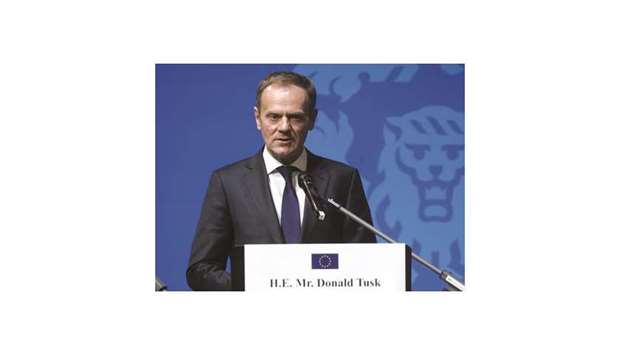Despite a steep decline in the number of arrivals to Europe since the influx of 2015-16, the issue returned to the political agenda in recent months after Italy started blocking its ports to migrants rescued at sea, insisting other member states take them in.
Italy’s populist government has joined the hardline stance of Austria and several Central European states that argue that the only way to stop illegal migration is to strengthen external EU borders, while opposing attempts to redistribute asylum-seekers within the bloc.
“If some want to solve the crisis, while others want to use it, it will remain unsolvable,” Tusk wrote to EU leaders in his invitation letter to the summit, taking place tomorrow and on Thursday.
“I am hoping that in Salzburg we will be able to put an end to the mutual resentment and return to a constructive approach,” he added.
By co-operating, the EU has managed to bring the influx of migrants back down to pre-crisis levels, Tusk noted.
The issue of migration has been seized upon by populist, nationalist and anti-EU parties ahead of EU elections next year in which such movements are expected to challenge the political establishment.
At their last summit in June, EU leaders agreed in principle to the idea of controlled migrant centres and so-called disembarkation platforms.
Both concepts remain to be fleshed out.
The former would be based on European soil, to process migrants and initially assess asylum claims.
The latter would be based in northern African countries, with a view to returning migrants rescued in the Mediterranean Sea.
While no breakthrough is expected on either proposal, Italian Prime Minister Giuseppe Conte is due to advance some ideas that came out of his talks with leaders over the past few months, an EU source said yesterday on condition of anonymity.
Egypt, in particular, has successfully tamped down migration flows to Europe in close co-operation with the EU.
This could be a “blueprint” for other states outside the bloc, the source added.
Last week, Conte said Europe has the chance to “turn the page” on the issue of migration, in light of new proposals by the European Commission.
They include boosting the size and powers of European border and coastguard agency, Frontex, further developing the EU asylum agency to help member states process asylum claims, and accelerating the return of illegal migrants.

